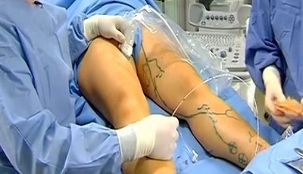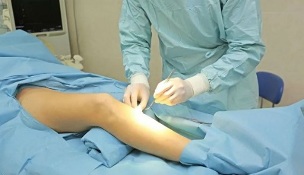
Late access to a phlebologist with developed varicose veins is the main reason why it is too late to act on the disease with ointment or gel. The doctor has to prescribe a more effective treatment, among which the most effective is surgery for varicose veins in the legs.
Don't forget that even surgical removal of the affected vessel does not guarantee complete healing - the disease can spread to healthy tissues.
Phlebologist - why contact you
Who should be contacted if varicose veins are suspected? The disease should not be expected to spread, as the first symptoms should be the main reason to seek medical help. Only a phlebologist can confirm or deny the diagnosis and should be contacted first. Only he, if necessary, can refer to another specialist.
For what symptoms do you need to visit a phlebologist immediately? There are so few:
- bright vascular stars that appear in the lower limbs;
- weight on the legs, usually accompanied by severe swelling;
- seizures, most often disturbing at night;
- change in skin tone, it becomes darker and less natural.
If you don't run to the hospital, the disease will develop quickly and the spider veins will start to grow and protrude above the skin. The only treatment option in these cases is surgery for varicose veins in the legs, which a phlebologist will prescribe after a thorough examination.
What types of leg surgery can be prescribed by a phlebologist
Surgical treatment may be prescribed depending on the degree of vascular damage. Only a phlebologist can determine which method is needed to get rid of the disease, but this will require a series of studies.
Types of leg surgery:
- Miniflebectomy. It is performed with minor vascular lesions. During the operation, the doctor makes punctures, through which the veins are removed. After the procedure, small defects remain in the lower extremities, which are almost invisible.
- Phlebectomy. The most common, but also the most traumatic to the skin, is surgery, which leaves scars. The surgeon makes long incisions through which he removes the vessels affected by the disease. Rehabilitation is short - the next day the patient can go home.
- Short withdrawal. Incisions are not made - the surgeon makes several punctures where only the diseased part of the vessel is removed.
- Sclerotherapy. A special substance is injected into the affected vessels, it glues the destroyed tissues. There is no postoperative period - the patient can go home immediately after the procedure.
- Intravenous coagulation. Exposure to veins affected by laser is the safest and fastest method of treatment. Efficiency and painless are the main advantages of the treatment.
Surgery for varicose veins in the legs is the most extreme treatment option, although in most cases it is the most effective.
Laser varicose vein surgery
New methods in medicine make it possible to eliminate the affected vessels from the lower extremities practically painlessly and with minor injuries. Laser surgery for varicose veins is an excellent alternative to surgical treatment.
When is intravenous coagulation indicated? There are few reasons for the operation, and all of them do not respond to local or pill treatment:
- varicose veins, in which large and important vessels for life were affected;
- weight and swelling in the lower extremities that do not respond to another treatment; trophic changes
- have been found on the skin;
- the lower limbs are covered with ulcers that are not affected by topical medications.
How is the operation going? The surgeon makes an incision in front of the affected vessel and inserts a special laser-tipped probe. The laser glues the affected areas of the vessel, after which the next incision is made and the restoration of the vein continues.
Laser treatment - what are the advantages of the method over other operations
Despite the considerable number of types of operations for varicose veins, it is the effect of the laser that has been gaining popularity among patients. A significant role is played here by the low cost of the procedure, but more often the victims of the disease are attracted by the absence of pain during the operation and efficiency.

Laser treatment has many advantages that also attract patients:
- immediately after the operation, you can go home and start your daily activities;
- the procedure is performed under local anesthesia;
- no consequences remain on the skin;
- the procedure is performed in just a few hours;
- with no need for recovery from surgery;
- there is no risk of bruising or bleeding;
- the procedure has practically no contraindications.
Before the operation, you will have to undergo special studies that will help to determine exactly that there is no other treatment option. During the additional examination, it will also be revealed if there are any contraindications and if the laser will cause complications or side effects.
Consequences that may arise after the operation
Even if the operation, despite the method chosen, was successful, there is no guarantee that unpleasant and unexpected consequences will not occur. Most of the time, especially if the surgical intervention was used, scars remain that can remain for life. To avoid this, you can find out in advance with your doctor which drugs or folk remedies promote healing and prevent scarring.
Another of the consequences that can occur after surgery is a recurrence of the disease. Even if the procedure is successful, doctors cannot guarantee that healthy tissues will not be affected by the disease. Of course, this will not happen immediately, but it is best to carefully monitor the condition of the vessels and, at the first signs of damage, immediately consult a doctor.
You can ask your doctor about how to avoid unpleasant consequences immediately after the operation. The phlebologist is obliged not only to report in detail what measures will be used for prevention, but also to recommend medications or folk remedies that can be used at home to prevent relapses.
Rehabilitation - what you need to do to avoid complications after surgery
Only after several types of surgery may there be a need for rehabilitation, and this period has its own characteristics. The requirements and rules that the patient must comply with are determined by the specialist separately, at the individual level.
Most of the time, during the rehabilitation period, medical underwear is prescribed, which helps to strengthen the walls of the vessels on which the surgery was performed. The class and type of compression stockings are prescribed only by the doctor, and cannot be done independently - an error in the choice threatens to develop the disease again. The duration of use of the medical underwear is also determined by the phlebologist - for some patients, several weeks are enough, for others, with complications, they will have to wear mesh for longer.
Another stage of recovery is the ingestion of special medications that restore blood flow in the vessels undergoing surgery. Medicines are only prescribed by a phlebologist, and many of the drugs have many contraindications that must be examined carefully before taking them.
Surgery for varicose veins in the legs is almost the only way to get rid of a progressive disease. You shouldn't be afraid to go to the doctor if the disease develops quickly and inexorably, affecting healthy tissues - if you don't stop the disease immediately, even the operation can be impotent.




































